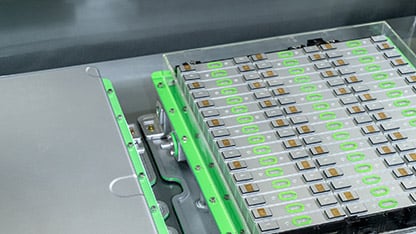What does the proposed extension of the battery due diligence deadline for the EU Battery Regulation mean for battery manufacturers and users?

22 May 2025
Understand how the EU’s proposed postponement of the battery due diligence obligation deadline will impact your compliance preparations for products regulated by the new EU Battery Regulation, and how you can get ahead.
Yesterday, the European Union announced proposal to extend the battery due diligence deadline within the new EU Battery Regulation for two years. But what does this mean for battery manufacturers and products using batteries?
The implementation timeline for the EU Battery Regulation (EUBR) is ambitious, with new obligations and requirements almost yearly. On 21 May 2025, the EU announced a proposed change to the implementation date of one of the key obligations in the Regulation, the battery due diligence obligation. The implementation dates for the rest of the EU Battery Regulation’s requirements and obligations, such as the CE conformity assessment, battery waste management and the battery passport, all remain unchanged.
What are the new deadlines for battery due diligence?
This latest announcement proposes that the battery due diligence obligations in the EU Battery Regulation will be postponed for two years, until 18 August 2027.
The Commission’s guidelines on the application of the due battery diligence requirements are now expected to be published before 26 July 2026. It is anticipated that this guidance will be harmonized with how to conduct due diligence according to the EU’s Corporate Sustainability Due Diligence Directive (CSDDD).
Why has the battery due diligence deadline been extended?
Three reasons have been provided for the proposed postponement:
- Battery manufacturers need more time to analyze and, where necessary, adjust their supply chains in relation to the sourcing of raw materials.
- The designation of notified bodies for battery due diligence policies is taking longer than expected.
- More time is needed to further develop and implement due diligence schemes that address batteries’ raw materials. The due diligence schemes need to also be recognized under the regulations, with more time required for any schemes to go through the necessary recognition process before the obligations can start to apply.
What companies need to comply with battery due diligence?
In the EU Battery Regulation, small and medium-sized enterprises (SMEs) are exempt from the battery due diligence obligations. The EU has now announced a change in the proposed threshold which will mean more companies than previously expected will be excluded from the battery due diligence obligations.
The proposal is that small mid-cap enterprises (SMC) should also be exempt from the obligation. This means that companies with a net turnover of less than EUR 150 million will be exempt, instead of the previous threshold of EUR 40 million.
How often will the battery due diligence need to be reviewed?
To reduce the administrative burden, the EU has also announced a proposal that the publicly available report on the company’s battery diligence policy should be reviewed at least every three years, instead of yearly.
What should companies be doing now to get ready for the battery due diligence obligations?
While the EU’s proposed postponement of the battery due diligence requirements to 18 August 2027 gives businesses more time to get ready, there is still a significant amount of preparation and implementation required prior to the deadline. The companies that plan ahead and keep preparing now will be in the strongest compliance position.
Taking the time to fully map and validate your supply chain, implementing any changes and embedding new processes into your organization takes time. Doing this while minimizing disruption to your operations is critical to ensure commercial performance and competitive advantage.
How can Intertek help you to prepare for the battery due diligence requirements?
Our expert teams can work in partnership with you and your teams to successfully navigate the EU Battery Regulation’s battery due diligence obligations. to discover how we can help you get ready to comply with the updated battery due diligence requirements.
Find out more about our due diligence services:
- Supply chain mapping
- Due Diligence Training
- Due Diligence Gap Analysis
- Inlight (End-to-End Supply Chain Risk Management Platform)
- Development of supplier self-assessment questionnaires (SAQs)
Discover Intertek’s safety and compliance solutions for batteries and energy storage systems:
